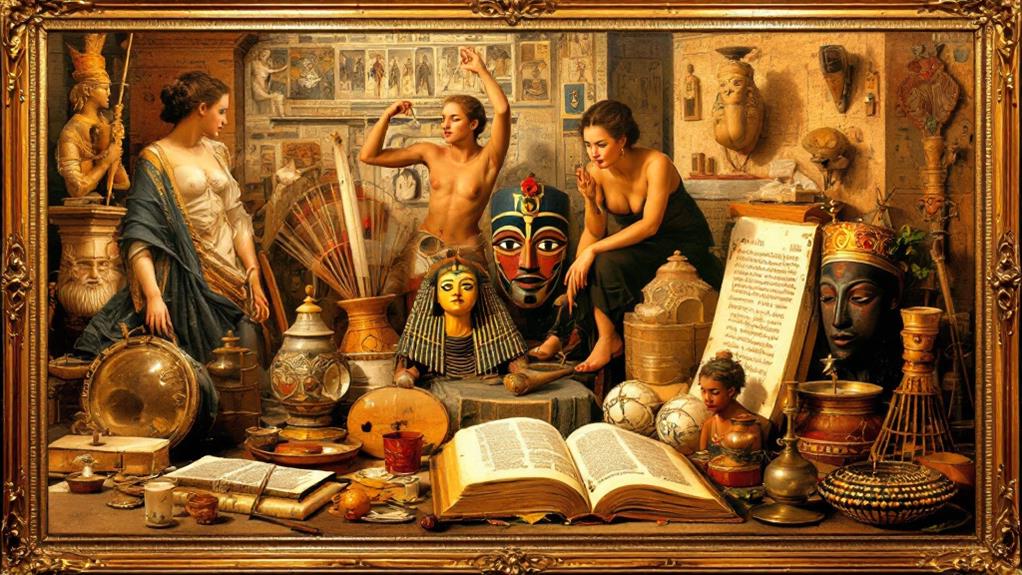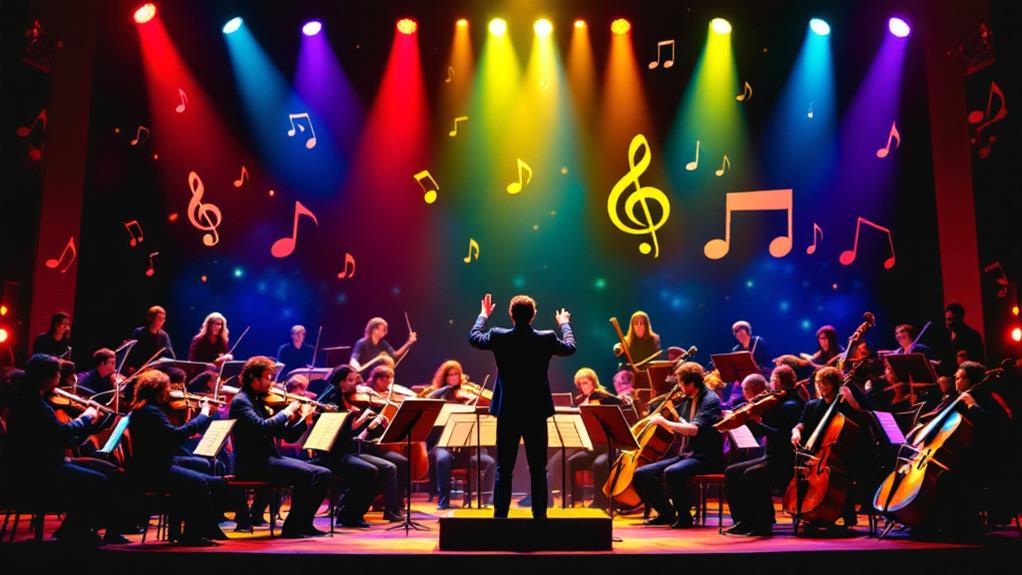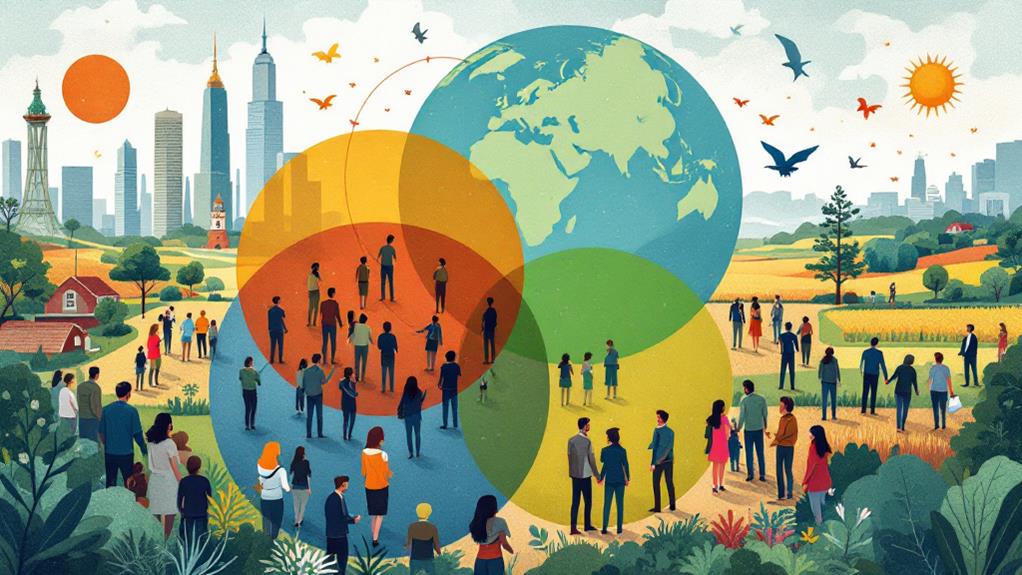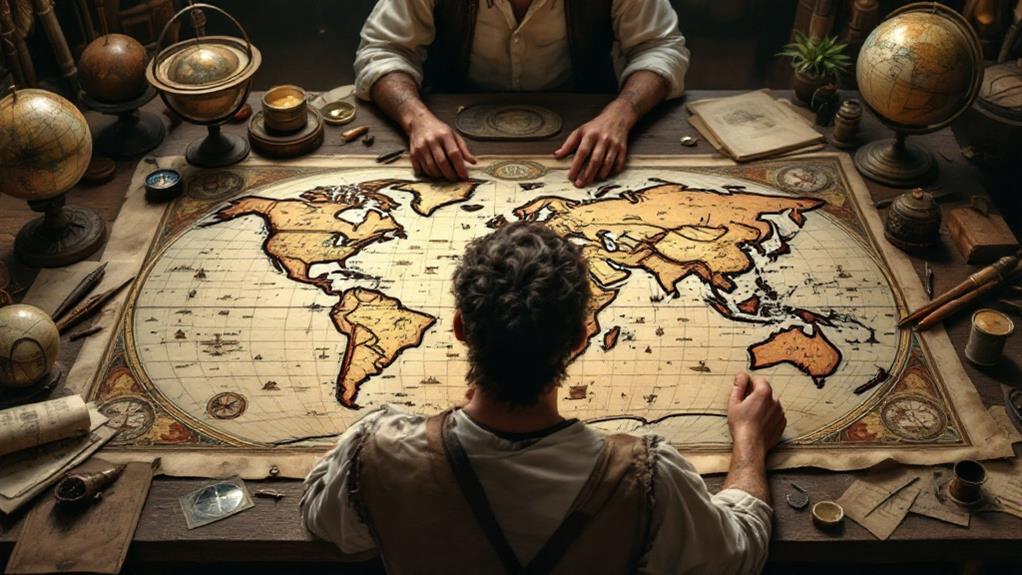An Introduction to Humanities: Exploring Art, Culture, and History

You'll commence on a compelling expedition through human creativity and expression when you dive into the world of humanities. This interdisciplinary field explores art, culture, and history, examining how people have communicated ideas and experiences across time. You'll discover the birth of philosophy in ancient Greece, trace literature's evolution, and explore visual arts from diverse cultures. Music, theatre, and historical perspectives will broaden your understanding of human achievement. You'll also grapple with religion's influence on cultural identity and consider ethical dilemmas in social contexts. This introduction is just the beginning of a fascinating exploration of our shared human heritage.
Defining the Humanities
Three key disciplines form the core of the humanities: art, history, and culture. When you investigate these fields, you're diving into the essence of human experience and expression. The humanities encompass a wide range of subjects that examine how people interpret and document the world around them.
Art allows you to study creative expressions across various mediums, from painting and sculpture to literature and music. History provides setting for human achievements and societal changes over time. Culture examines the beliefs, customs, and social behaviors that shape different communities.
Critical thinking is central to the humanities. You'll analyze texts, artifacts, and ideas, developing skills to interpret complex information and form well-reasoned arguments. Interdisciplinary studies are also crucial, as you'll often find connections between different fields, deepening your understanding of human experiences.
The Birth of Philosophy
While the humanities encompass a broad range of human expression, philosophy stands out as a foundational discipline that emerged in ancient times. The birth of philosophy marked a significant shift in human thinking, as people began to question the world around them systematically.
The origin of philosophical thought can be traced back to ancient Greece, where early Greek philosophers sought to understand the nature of reality, knowledge, and existence. You'll find that figures like Thales, Anaximander, and Anaximenes in the 6th century BCE laid the groundwork for Western philosophy by proposing rational explanations for natural phenomena.
As you investigate deeper into this subject, you'll uncover how Socrates, Plato, and Aristotle further developed philosophical inquiry, tackling questions of ethics, politics, and metaphysics. Their ideas continue to influence modern thought and shape our understanding of the world.
Philosophy's birth wasn't limited to Greece, though. You'll also encounter parallel developments in other ancient civilizations, such as India and China, where thinkers probed similar questions through different cultural lenses.
Literature Through the Ages

Literature has evolved dramatically throughout human history, reflecting the changing values, beliefs, and experiences of societies across time. As you probe this rich tapestry, you'll encounter classic literary works that have shaped our understanding of the human condition. From ancient epics like the "Iliad" and "Odyssey" to Shakespeare's timeless plays, these texts continue to reverberate with readers today.
You'll uncover how literature has adapted to new forms and styles, from the rise of the novel in the 18th century to the experimental prose of the 20th century. Contemporary literary analysis offers fresh perspectives on these works, revealing hidden meanings and challenging traditional interpretations.
As you immerse deeper, you'll see how literature has served as a powerful tool for social commentary and change. Writers have used their craft to critique societal norms, expose injustices, and imagine alternative futures. Through the ages, literature has been a mirror reflecting our world and a window into others, cultivating empathy and understanding across cultures and generations.
Visual Arts Across Cultures
Throughout history, visual arts have served as a universal language, transcending cultural and linguistic barriers. As you plunge into the world's artistic heritage, you'll encounter a rich tapestry of stylistic diversity and artistic innovation. From ancient cave paintings to contemporary digital art, visual expression has evolved alongside human civilization.
When examining visual arts across cultures, you'll notice how different societies have developed unique aesthetic traditions. These traditions often reflect:
- The natural environment and available materials
- Religious and spiritual beliefs
- Social structures and historical events
You'll find that artistic innovations often emerge at the intersection of cultures, where ideas and techniques are exchanged and reimagined. For example, the Silk Road facilitated the blending of Eastern and Western artistic styles, while colonialism led to the fusion of indigenous and European aesthetics.
As you immerse yourself deeper into global visual arts, you'll discover how artists have pushed boundaries, challenged conventions, and created new forms of expression. By studying these diverse artistic traditions, you'll gain a deeper understanding of human creativity and the complex tapestry of world cultures.
Music and Human Expression

Just as visual arts speak volumes across cultures, music strikes a chord deeply with the human spirit. You'll find that across the globe, diverse musical styles have emerged as powerful forms of expression. From the haunting melodies of traditional folk songs to the complex harmonies of classical orchestras, music has the unique ability to convey emotions and stories without words.
As you immerse yourself in various musical traditions, you'll uncover how different cultures use rhythm, melody, and harmony to create emotional resonance. You might feel your heart race to the beat of African drums or find yourself moved to tears by a mournful Chinese erhu solo. The universality of music allows you to connect with people from all walks of life, transcending language barriers and cultural differences.
Music also serves as a historical record, capturing the essence of different eras and social movements. When you listen to protest songs from the 1960s or wartime ballads from centuries past, you're experiencing history through sound. By studying music's evolution, you'll gain comprehension into how societies have changed and how human expression has adapted over time.
Theatre and Performance Traditions
From ancient Greek amphitheaters to modern Broadway stages, theatre has enthralled, enraptured, enchanted audiences for millennia. As you investigate the world of theatre and performance traditions, you'll uncover a rich tapestry of artistic expression that spans cultures and centuries.
Theatrical techniques have evolved over time, yet many core elements remain unchanged. You'll find that performative rituals, whether in religious ceremonies or avant-garde productions, often share common threads. These traditions connect us to our shared human experience, allowing us to probe complex emotions and ideas through the power of live performance.
To truly appreciate theatre's impact, imagine yourself:
- Sitting in a dimly lit playhouse, the curtain rising to reveal a meticulously crafted set
- Watching actors transform into characters before your eyes, their voices and movements bringing stories to life
- Feeling the energy of a rapt audience, collectively holding their breath during a pivotal moment
As you delve deeper into theatre and performance traditions, you'll uncover the intricate interplay between text, movement, and visual design that creates the magic of live performance.
Historical Perspectives in Humanities

Historical viewpoints in the humanities offer a time-traveling lens through which you can examine the evolution of human thought, creativity, and culture. By studying ancient civilizations, you'll uncover the roots of modern society and gain insights into the development of art, literature, and social structures. You'll probe how philosophical frameworks have shaped human understanding and behavior throughout time.
As you immerse yourself in historical perspectives, you'll discover how past events and ideas continue to influence contemporary society. You'll analyze primary sources, such as ancient texts and artifacts, to piece together narratives of human experience across centuries. This approach allows you to contextualize current issues and debates within a broader historical framework.
You'll also examine how different cultures have interacted and influenced one another over time, leading to the rich tapestry of global heritage we see today. By understanding historical perspectives in the humanities, you'll develop critical thinking skills and a multifaceted understanding of human progress. This knowledge will equip you to engage more meaningfully with contemporary cultural and social issues, informed by the wisdom of the past.
Religion and Cultural Identity
Religion has deeply shaped cultural identities throughout human history. As you delve into the interplay between faith and culture, you'll uncover how spiritual traditions influence community values, social norms, and individual behaviors. Religious beliefs often serve as the foundation for moral codes, rituals, and customs that define a society's unique character.
Consider how religion impacts cultural identity through:
- Sacred spaces: Temples, churches, and mosques that serve as focal points for communal gatherings and spiritual practices
- Symbolic attire: Distinctive clothing or accessories that signify religious affiliation and cultural belonging
- Festivals and celebrations: Annual events that bring communities together to honor shared beliefs and traditions
You'll find that religion's influence extends beyond personal faith, shaping art, literature, music, and construction. It's woven into the fabric of daily life, from dietary restrictions to social interactions. By examining the role of religion in cultural identity, you'll gain a deeper understanding of how diverse societies have developed and maintained their unique characteristics over time. This knowledge will help you appreciate the complex relationships between faith, culture, and individual identity in our increasingly interconnected world.
Ethics and Social Responsibility

Ethics and social responsibility go hand in hand when exploring art, culture, and history. As you immerse into these subjects, you'll encounter complex moral dilemmas and societal issues that challenge your perspectives. Understanding ethical decision making is imperative in navigating these waters, as it helps you evaluate the impact of artistic expressions, cultural practices, and historical events on individuals and communities.
You'll find that many artists, cultural institutions, and historical figures grapple with questions of social responsibility. This concept extends beyond personal actions to include corporate social responsibility, where organizations are expected to contribute positively to society. As you study various artworks, cultural artifacts, and historical documents, you'll need to ponder the ethical implications of their creation, preservation, and presentation.



